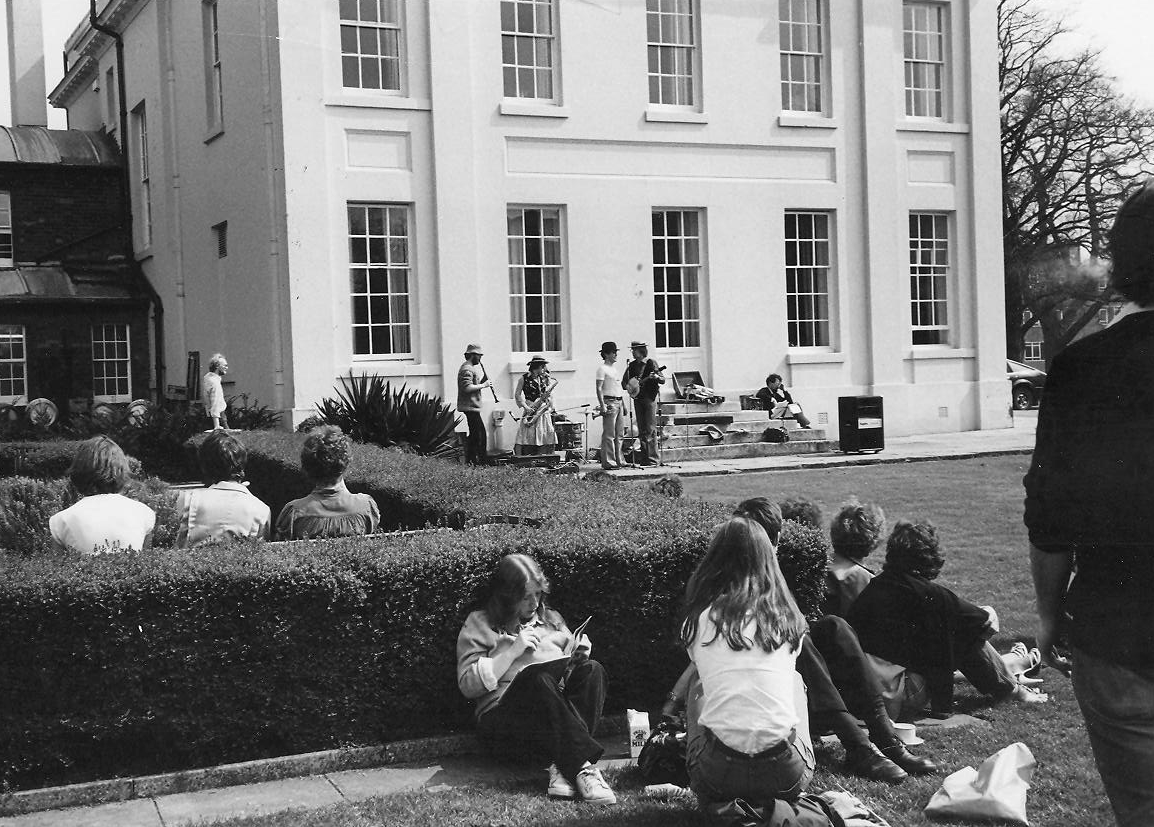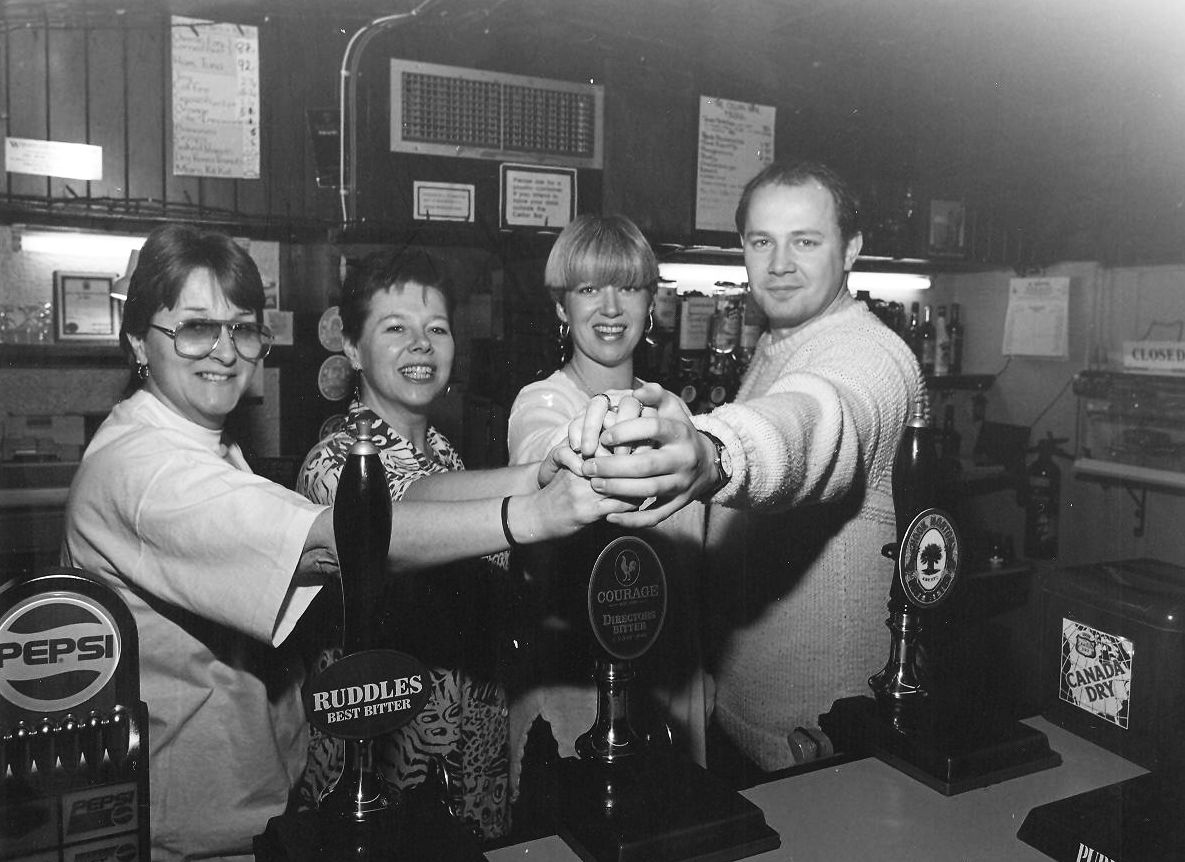You are here
- Home
- About OU Club
- History
History
Introduction
It was always the intention that there would be a social, cultural and recreational aspect to Open University life for staff. The Open University Club (OU Club) was established in the early days of the University to facilitate this. The first annual report of the University makes reference to the Club:
Various schemes have been introduced for the benefit of staff during the period under review. On the social and recreational side a Club, open to all members of staff, was created.
Planning for Club activities had started before the move from Belgrave Square, for once the University moved to Milton Keynes there would be a large and sudden influx of new staff - particularly in the secretarial and clerical grades - and it was important to promote as soon as possible a community of interest and sense of common purpose. Happily, a generous benefaction from the Aneurin Bevan Memorial Trust enabled the former dark and cob-webbed cellars of Walton Hall to be transformed into three attractive Club Rooms - bar, games-room and lounge - which were occupied in March 1970. These rooms, all too small for the growing number of staff, have nevertheless provided a focus for the activities of the Club. There have been social, recreational and cultural activities seeking in various ways to draw together the several categories of staff and their families and to provide a range of amenities for them. In addition the Club has taken an interest in the wider responsibilities of the University and as occasion has offered has sought to establish friendly contacts with members of the general public and other institutions in the area.
From The Early Development of the Open University Report of the Vice Chancellor
January 1969 - December 1970, page 19.
The Open University Club
In the early days, membership was open to all members of staff. However, there was a £3 subscription. In July 1970, an analysis of Club membership led to the subscriptions being dropped in February 1971 and a subvention provided to cover running costs. Initially, the OU Club was run by a volunteer committee but later on, a permanent member of staff was employed to administer Club activities and work with the committee as a semi-autonomous unit within the University. The subvention was in two parts, one to cover the staff costs of the permanent staff member and a second element to support Club activities.
In the early 2000's the OU Club became integrated within Estates, with managerial responsibilities lying with the Operations Manager. Funding for the Club was changed to reflect this move with the subvention being stopped and the club bidding to Estates for funds to cover its forecast costs. The OU Club is still run by a volunteer committee,elected each year at its AGM, with a permanent Club co-ordinator in place to work alongside them.
OU Club Committee
The first OU Club committee was established in 1970, with the first AGM held in November that year. The Committee comprised among its ranks a number of senior staff:
- Walter Perry, Vice Chancellor (Honorary Chair)
- Michael Drake (Chair Professor)
- Peter Price (Vice Chair)
- John Martin (Treasurer)
Today’s committee still comprises volunteers, with additional support from the Club co-ordinator and other staff from within Estates to ensure that all proper practices are adhered to. However, voting at committee is restricted to those volunteers elected at the AGM.
Affiliated Clubs
From the outset, various clubs affiliated to the OU Club were established and run by staff to cater for a range of interests. Football, badminton, film, cricket and wine clubs were some of the earliest with an ever growing list over the years with today over 40 clubs covering such diverse interests as belly dancing, astronomy, various music societies and a range of sporting clubs many of which represent the University in local leagues. Each one of the affiliated clubs is managed by an elected committee who raise funds through subscriptions to run their events. All are eligible to financial and other support from the OU Club.
In the early days, several clubs had to play off campus as facilities were severely limited. Today, however, the University has some of the best facilities within Milton Keynes and is a respected member of many leagues and societies within the local area.

Regions and Nations
The OU Club has always recognised that our colleagues working at off-campus locations do not have the same access to facilities as enjoyed by those at Walton Hall. To that end, a significant proportion of the Club budget is used to encourage the regions and nations to organise their own events and to take advantage of activities in their own locale. Support is also offered to enable them to attend events that are more Walton Hall focused.
Entertainment
In addition to the activities organised by the affiliated clubs, the OU Club has a long tradition of organising events for staff, families and friends. Organised rambles were introduced early on and trips to Southend Illuminations and Wembley Ice Arena to see Jack and the Beanstalk were some of the first trips organised. The OU Club continues to offer a range of trips, often discounted, each year ranging from European Christmas fayres to theatre trips to museums lifestyle events, many of which are suggested by staff.
The jewel in the crown of University events was the Charter Ball, which is sadly no more. The first ball was held in June 1971 with 500 guests attending. An enormous amount of organisation was required with the Club working closely with the Staff Facilities team. Minutes from various meetings show that as much time was spent discussing dress code as all the other aspects of laying on such an event. This tradition continued for many years, until the last ball, when not only did the marquee take a lightning strike (luckily no-one was in it at the time) but a planned robbery led to the bar takings being stolen.
Catering
The first outlet run by the Club was the Cellar bar. With the help of a generous donation from the Anuerin Bevan Memorial Fund, the cellars of Walton Hall were transformed into Club rooms including a bar. The first pint was drawn by the Vice Chancellor Walter Perry and Professor Michael Drake introduced Johnny Dankworth and Cleo Laine who raised a glass to the success of the club. Initially, no food was available. One reason may have been due to an observation by one Club member that:
’... if sufficient beer is to be stored for instance, there just isn’t room for food…’
Food was subsequently introduced starting with such favourites as pasties and jacket potatoes and leading on to a selective range of bar meals.
The Cellar was to be self financing with the cost of the operation being funded solely by bar takings. In the early days this never seemed to present a problem as the bar quickly became a firm favourite both at lunchtimes and after work.
Later on the bars were run in the evening by post graduates students happy for the extra pocket money that the occasional shift gave them.

In 2005, management of both the Cellar and Pavilion bars was integrated into the overall catering franchise and the OU Club no longer have any control over them although they are frequently used (particularly the Pavilion) to hold affiliated club events.
Discounts
The University negotiated with local traders for goods and services to be purchased at discounted rates for OU staff. Early adopters were Dobbies, with a generous 20% discount, and Don Coleman sports based in Bletchley. The OU Club continues with this tradition and has a range of shops, many nationwide, offering goods and services at discounted prices.